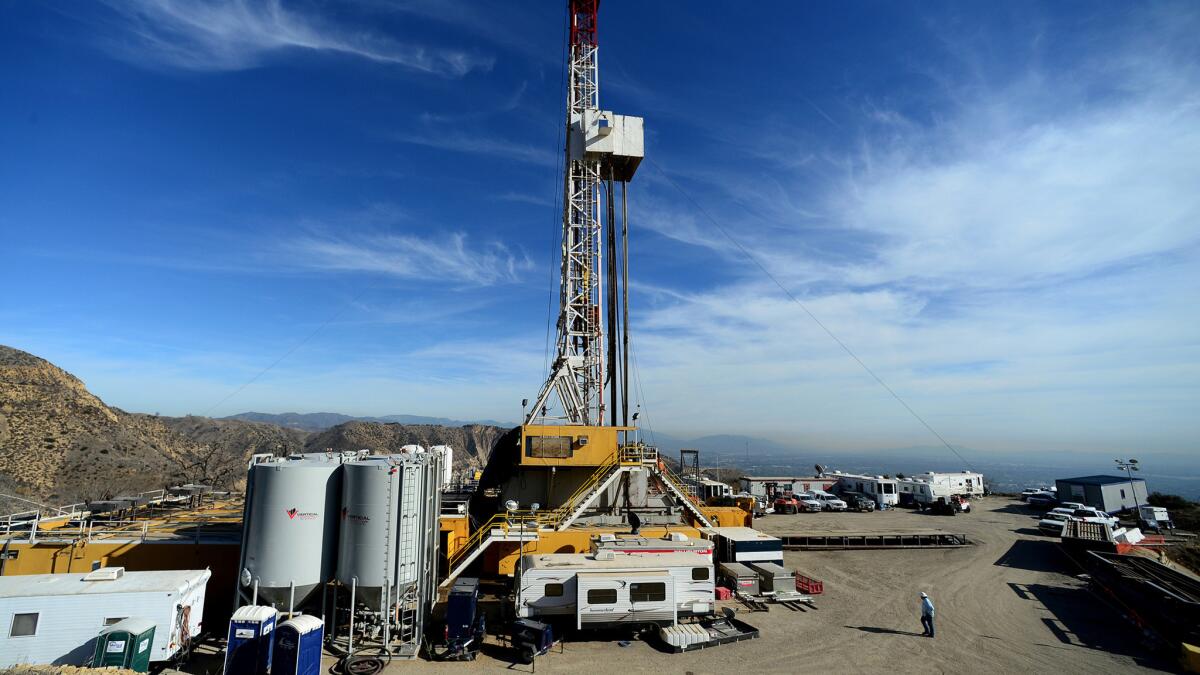SoCal Gas’ sleazy ‘Astroturf’ effort to keep fossil fuels flowing in California

- Share via
Southern California Gas Co. is in hot water again.
The utility is still under investigation for the massive 2015 Aliso Canyon natural gas leak, a climate disaster that forced 8,000 residents near Porter Ranch to evacuate for months.
Now, an independent watchdog within the California Public Utilities Commission has accused the utility of using ratepayer dollars to create a front group to lobby against state climate change policies — and then lying about it.
This is the last thing SoCal Gas needs. The company was responsible for one of the worst environmental disasters in U.S. history, and recently it’s been trying to make the case to policymakers that Aliso Canyon needs to stay open for energy reliability. These new allegations only undermine public trust in the utility.
The new problems arose earlier this year when a group called Californians for Balanced Energy Solutions filed a document with the CPUC asking to be designated an official “party” in the rule-making process on how to reduce greenhouse gas emissions from homes and buildings. This is part of California’s ambitious goal to slow climate change by dramatically reducing or even eliminating the use of natural gas and other fossil fuels.
Natural gas emissions from California’s 12 million buildings account for 12% of its greenhouse gas emissions. Climate activists say the state should shift from natural gas to electricity.
Californians for Balanced Energy Solutions, or C4BES, said in its filing that it was “representing the interests of gas industrial, commercial and residential users” in the debate over building decarbonization and that it intended to argue that electrification “is NOT the fastest nor most efficient way to address climate change.”
Nowhere in the filing did C4BES mention that it was created and funded by SoCal Gas, which stands to lose a significant amount of business if natural gas is replaced around the state with electricity from renewable sources.
It’s now a pretty common tactic for big industries to form “astroturf” groups — fake grass-roots organizations — to advocate on their behalf. It’s sleazy but not necessarily illegal. However, SoCal Gas crossed the line, the CPUC’s Public Advocate said.
First, C4BES, as a shadow lobbying arm of SoCal Gas, was attempting to take part in a rule-making process without disclosing its relationship with the utility. That would inappropriately amplify SoCal Gas’ voice in the proceeding, making it seem like there are two parties making their case when it’s really just one.
Second, the Public Advocate’s office said that SoCal Gas gave conflicting and misleading statements when questioned about whether it was funding C4BES with ratepayer money. The company said it was using shareholder funds, but documents turned over at the Public Advocate’s request show that the company used ratepayer money to create and pay for the group. Utilities are not allowed to use ratepayer funds for political advocacy.
SoCal Gas executives insist they’ve been open about the fact that the utility helped create C4BES — although the utility’s public comments on the relationship have not been so clear. Utility executives say they’ve been frustrated that CPUC members and environmental groups are singularly focused on electrification without giving enough consideration to renewable gas produced from landfills and dairies, or to the use of hydrogen as viable ways to go carbon-neutral. C4BES is supposed to show that there is a broad base of support for SoCal Gas’ vision.
Here’s the problem, though. SoCal Gas can’t put up the money and manpower to create a supposed grass-roots “coalition” and expect people to take it seriously as an independent voice. It’s always better to have more stakeholder input and more viewpoints expressed. But SoCal Gas and other industry operators lose credibility and trust when they take shortcuts and try to fake popular support that is in truth manufactured.
More to Read
A cure for the common opinion
Get thought-provoking perspectives with our weekly newsletter.
You may occasionally receive promotional content from the Los Angeles Times.






